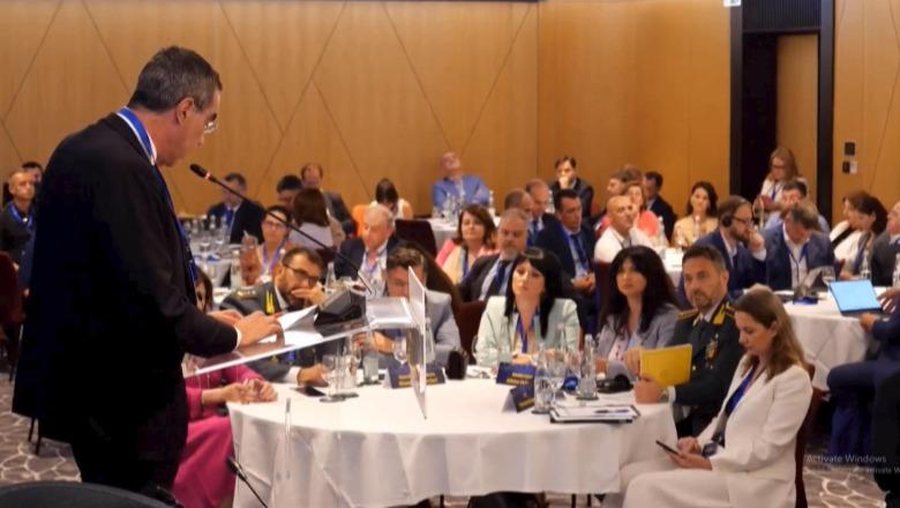
The Directors General of Customs Administrations from the Western Balkans and European Union member states gathered today in Tirana where they participated in the second high-level conference on the topic: "Customs Partnership for a Connected Europe".
This activity served as a key platform to strengthen strategic customs cooperation, support the objectives of the EU Growth Plan for the Western Balkans, and accelerate the region's approximation to European Union standards.
The conference concluded with the adoption of a Joint Declaration, where the parties reaffirmed their commitment to accelerating harmonization with the EU Customs Code, expanding and institutionalizing the Green and Blue Lanes, and increasing real-time data exchange through the SEED+ system.
The importance of deepening inter-institutional cooperation and with the private sector was also emphasized, as well as support for the recognition and development of Authorized Economic Operator (AEO) programs.
Deputy Prime Minister and Minister of Infrastructure and Energy, Belinda Balluku, in her welcoming speech, underlined that the EU enlargement process and the integration of the Western Balkans constitute the European Union's most important geopolitical investment in this decade.
She emphasized that EU membership is not only about economic development and prosperity, but also about the common European values that unite the peoples of the region.
Balluku expressed his belief that, after many challenges, the region is closer than ever to joining the European Union, thanks to the commitment of national administrations and the political will of member countries.
The Minister of Finance, Petrit Malaj, stressed that Albania is carrying out comprehensive reforms in the customs administration, which are among the largest in the country's history, focusing on approximation with EU standards. He emphasized that with the opening of Chapter 29 "Customs" in the accession process, the government is working intensively to modernize customs procedures and prepare to become part of the EU Customs Union.
Edna Karadza, SEED+ Project Manager at the CEFTA Secretariat, stated that digitalization is essential for building the regional common market.
She emphasized that SEED+ is the operational instrument behind the Green and Blue Lanes initiative, which ensures real-time data exchange, enabling faster, more efficient and more transparent customs procedures.
Karadza underlined that this system supports the main objectives of the EU Growth Plan for connectivity, modernization and integration with European customs systems.
The Director General of Customs, Genti Gazheli, said that the main priority is the creation of an efficient and transparent customs system, which not only facilitates legal trade, but also strengthens the fight against smuggling, trafficking and any other form of violation of the law.
"This process requires continuous modernization and improvement of technological systems, managerial capacities, as well as close international cooperation," he said.
An essential dimension in this process, Gazheli noted, is assistance and cooperation with the customs administrations of European Union member states, especially those neighboring Albania, such as Italy and Greece.
"For example, the implementation of initiatives such as the 'green lanes' on land routes, which facilitate the movement of goods and reduce waiting times at border crossings, is an important step towards harmonizing customs procedures. At the same time, the exchange of information within the 'blue corridor' on sea routes helps in more efficient traffic management and better cargo control," he said.
These initiatives, continued Gazheli, are part of the ongoing commitment to create a modern, reliable customs environment in line with international standards.
The Director General of Greek Customs, Dimitrios Bourikos, said that a pilot project will be implemented at the Kakavija border crossing point according to the EU directive, in cooperation with the Albanian side, as a concrete step towards deepening cooperation and exchange of customs intelligence.
The project will help facilitate information exchange and strengthen the fight against smuggling and trafficking in human beings.
He emphasized that since 2005, initiatives have been taken for container control and that the SEED mechanism for electronic data exchange has helped improve transparency and efficiency.
He also mentioned the implementation of green channel practices, which have simplified customs procedures, in accordance with European Union directives.
The Director of the Customs of North Macedonia, Boban Nikollovski, focused on the challenges facing customs in the region, particularly the harmonization of legislation and customs code with EU requirements, the construction of modern infrastructure and the improvement of equipment.
The conference included three thematic sessions focused on strategic priorities of customs cooperation.
The first session addressed customs cooperation between the Western Balkan countries and the EU, highlighting operational successes and challenges in data exchange and legal approximation.
The second session discussed the expansion of Green and Blue Lanes at the CEFTA–EU borders and the importance of SEED+ for real-time data exchange and system interconnection.
The third session analyzed the role of customs in supporting economic growth and EU enlargement, through simplifying procedures, supporting business, and accelerating approximation to European standards.
This high-level meeting further strengthens regional and European cooperation in the customs field and promotes the path towards a more integrated, competitive and well-connected market between the Western Balkans and the European Union. (A2 Televizion)











